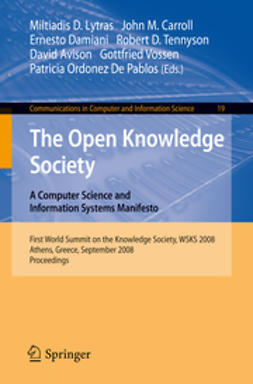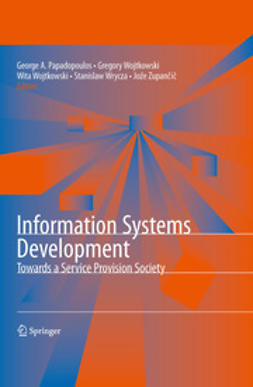Avison, David
The Open Knowlege Society. A Computer Science and Information Systems Manifesto
1. Significant Learning Communities – A Humanistic Approach to Knowledge and Human Resource Development in the Age of the Internet
Renate Motschnig-Pitrik
2. Wisdom Networks: Towards a Wisdom-Based Society
Nikunj Dalal
3. Step by Step Framework for Evaluation of In-Formation Technology Benefit in Social Scenarios
Esteban Vaquerizo, Yolanda Garrido, Jorge Falcó, Theresa Skehan, Alba Jiménez, Roberto Casas
4. The Knowledge Society Agenda in Romania: From Experts’ Vision to Public Perception
Horatiu Dragomirescu, Florin Gheorghe Filip
5. A Framework for the Knowledge Society Ecosystem:
Saad Haj Bakry, Ali Al-Ghamdi
6. The Green and Gold Road: Journal Management and Publishing Workflow Extensions for the DSpace Repository Platform
Andreas Geyrecker, Fridolin Wild
7. The Biggest Human GRID-s of the Future: Hybridization of Science and Public Education
László Z. Karvalics
8. The Grid for Learning
Nicola Capuano, Matteo Gaeta, Sergio Miranda, Francesco Orciuoli, Pierluigi Ritrovato
9. Online Social Networks: Why Do “We” Use Facebook?
Pui-Yee Chiu, Christy M. K. Cheung, Matthew K. O. Lee
10. Localization of Educational Software for Deaf Children: Suggestions and Perspectives
Ioanna Antoniou-Kritikou, Constandina Economou
11. Bottleneck of Knowledge Society
Jaroslav Král, Michal Žemli?ka
12. Emerging Approach to E2.0: The Case of Social Enterprise – First Results from a 1-Year Field Research
Mariano Corso, Antonella Martini, Luisa Pellegrini, Andrea Pesoli
13. Emergent Innovation and Sustainable Knowledge Co-creation A Socio-epistemological Approach to “Innovation from within”
Markus F. Peschl, Thomas Fundneider
14. Contribution to the Analysis of Motion Behaviour of People in a Region Using Video Frames
Ioannis Tzouvadakis, Athanassios Stamos
15. The Human Web and the Domestication of the Networked Computer
Ellen Christiaanse
16. Evaluation of the Energy Efficiency of Renewable Biomass Fuels: An Environmental and Financial Approach
Grigorios Kyriakopoulos
17. Strategic Use of Information Technology in Profit and Non-profit Organizations from Tanzania and Sweden
Johnny Flores, Anayanci Lopez, Norman Vargas, Lazar Rusu
18. Views on Globalization of Higher Education
Abdulkader Alfantookh, Saad Haj Bakry
19. Learning Objects for eLearning Systems
Erla M. Morales Morgado, Francisco J. García Peñalvo, Ángela Barrón Ruiz, Hugo Rego, Tiago Moreira
20. Personalized Video Browsing and Retrieval in a Semantic-Based Learning Environment
Antonella Carbonaro
21. Intelligent Tutoring in the Semantic Web and Web 2.0 Environments
Vlado Glavini?, Slavomir Stankov, Marija Zeli?, Marko Rosi?
22. Knowledge Management and eLearning in Professional Development
George Sammour, Jeanne Schreurs, Abdullah Y. Zoubi, Koen Vanhoof
23. MILCA – A Mobile and Interactive Learning Environment on Campus
Kin Choong Yow, Sintiani Dewi Teddy
24. An Evolutionary Approach for Domain Independent Learning Object Sequencing
Luis de-Marcos, José-Javier Martínez, José-Antonio Gutiérrez, Roberto Barchino, José-María Gutiérrez
25. Semantic Reasoning in Advanced E-Learning Brokerage Systems
Juan M. Santos, Rubén Míguez, Luis Anido, Martín Llamas
26. The Use of Wireless Network in Education
Spiros Panetsos
27. Context-Aware Mobile Learning
Anastasios A. Economides
28. Reliable Personalized Learning Paths: The Contribution of Trust to E-Learning
Vincenza Carchiolo, D. Correnti, Alessandro Longheu, Michele Malgeri, Giuseppe Mangioni
29. Advanced Tool to Develop the Assessment Process in Collaborative e-Learning Environments
Roberto Barchino, José-María Gutiérrez, Mario Triguero, Luis de-Marcos, Lourdes Jiménez
30. Collaborative Work and Multi-criteria Organization of Web Educational Resources: A Theoretical Framework
Alivizos Sofos, Apostolos Kostas
31. Knowledge, Knowledge Security, and Meta-knowledge
Bogdan D. Czejdo, Tadeusz Morzy
32. Content Requirements Identification towards the Design of an Educational Portal
Charalampos Z. Patrikakis, Maria Koukouli, Constantina Costopoulou, Alexander B. Sideridis
33. Training Adults on Traditional vs. Web 2.0 IS Topics: The Trainees’ View
Efthimios Tambouris, Konstantinos Tarabanis
34. ERA - E-Learning Readiness Analysis:
J. Schreurs, George Sammour, U. Ehlers
35. Applications and Exploration of ICT in Teaching History and Foreign Languages: Students and Teachers Attitudes, Perceptions and Evaluation
Anastasia Pamouktsoglou, John Antonopoulos, Ourania Kalouri
36. Learning to Invent: Let the New Knowledge Come
Carel S. Beer
37. The New Informatics Technologies in Education Debate
Prudenciano Moreno-Moreno, Cornelio Yáñez-Márquez
38. King Saud University Drive toward the Knowledge Society:
Ali Al-Ghamdi, Saad Haj Bakry
39. Metadata and Knowledge Management Driven Web-Based Learning Information System
Hugo Rego, Tiago Moreira, Erla Morales, Francisco José Garcia
40. Case-Based Reasoning: A Recent Theory for Problem-Solving and Learning in Computers and People
Michael Gr. Voskoglou
41. SOLERES-HCI: Modelling a Human-Computer Interaction Framework for Open EMS
Luis Iribarne, Jose A. Asensio, Nicolas Padilla, Rosa Ayala
42. Improving the Learning Process of Engineering Students by Deployment of Activating ICTs
Seppo Virtanen
43. Modeling Student’s Mood during an Online Self-assessment Test
C. N. Moridis, Anastasios A. Economides
44. Enhancing Motivation, School Competence and Self-perception of Physics in the Environment of the Cognitive Tutor CTAT during Physics Instruction
Evi Makri-Botsari, Sarantos Psycharis
45. An Examination of Assessment Practices in Colleges of Business at Various Middle East Countries
Nitham M. Hindi, Mohammad K. Najdawi, Hend Abdulrahman Mohamed Jolo
46. A Survey on Learning Profiles of the Educators of Roma in Greece in Order to Develop the Proper E-Learning Environment for Their Training
Maria Pavlis Korres, Elena García Barriocanal, Piera Leftheriotou
47. The Organizational Value of Tacit Knowledge Derived from Parenting
Eva Rimbau-Gilabert, David Miyar-Cruz, Jose María López-de Pedro
48. Assessing Enterprise’s Knowledge Management Maturity Level
Michel Grundstein
49. Grid Technologies to Support B2B Collaboration
Nicola Capuano, Matteo Gaeta, Sergio Miranda, Francesco Orciuoli, Pierluigi Ritrovato
50. Strategic and Managerial Ties for the New Product Development
Angelo Corallo, Nouha Taifi, Giuseppina Passiante
51. Semantic Web or Web 2.0? Socialization of the Semantic Web
Jorge Morato, Anabel Fraga, Yorgos Andreadakis, Sonia Sánchez-Cuadrado
52. A Critical Review of the Impact of Knowledge Management on Higher Education
Dionysia A. Alexandropoulou, Vasilis A. Angelis, Maria Mavri
53. On Growth of Network and Centrality’s Change Analysis of Co-inventors Network in Enterprise
Satomi Takagi, Ryoko Toyama
54. Computer-Supported Interaction for Preparing Logically Organized Documents
Toyohide Watanabe, Kei Kato
55. How Intranet Has Been Evolving in Banking: A Longitudinal Research
Mariano Corso, Antonella Martini, Alessandro Piva
56. Is the Digital Generation Ready for Web 2.0-Based Learning?
Vladlena Benson
57. Lean Six Sigma Applied to Supply Chains within a Services Organisation – A Practical Solution
Nuran Fraser, John Fraser
58. The Project Manager as Knowledge Creator and Communicator Analyzed with the Help of the Theatre Metaphor for Conscious Experience
Kaj U. Koskinen, Pekka Pihlanto
59. Software Engineering 2.0: A Social Global Repository Based on Semantic Annotation and Social Web for Knowledge Management
Ricardo Colomo-Palacios, Juan Miguel Gómez-Berbís, Ángel García-Crespo, Inmaculada Puebla-Sánchez
60. Tools for the Information System Function Management: A Roadmap
António Trigo, João Varajão, João Barroso
61. A Teleological Perspective towards the Definition and Measurement of Intellectual Capital
Gloria H. W. Liu, Eric T. G. Wang
62. A Decision Analytic Tool for Assessing Decision Making Performance
K. Nadia Papamichail, Nikolas Hadjiprocopiou, Procopis Hadjiprocopiou, Vidya Rajaram, Stephen J. Brewis
63. Studying Research on E-Markets during 1995-2005
Nikos Manouselis, Constantina Costopoulou
64. Knowledge Agent Theory and Its Autopoietic Characteristics for Authentic Knowledge Management
Chee Kooi Chan, Yan Yu Chan, W. H. Ip
65. The Effect of Organizational Learning Tools in Business Results
Inocencia Ma Martínez León, Josefa Ruiz Mercader, Juan Antonio Martínez León
66. Classification of Satellite Images Using the Cellular Automata Approach
Moisés Espínola, Rosa Ayala, Saturnino Leguizamón, Massimo Menenti
67. Preliminary Study of the Expected Performance of MAUT Collaborative Filtering Algorithms
Nikos Manouselis, Constantina Costopoulou
68. Distributed Dependable Enterprise Business System – DDEBS
Kiran Ijaz, Umar Manzoor, Arshad Ali Shahid
69. An Ontology Crystallization Approach to Designing Performance-Based Testing Scenario
Jui-Feng Weng, Shian-Shyong Tseng, Jun-Ming Su
70. The Art and Impact of Physical and Virtual Enterprise Incubators: The Greek Paradigm
Spyros Tzafestas
71. Designing IT Systems for NGOs: Issues and Directions
Saqib Saeed, Markus Rohde, Volker Wulf
72. Developing Ontology Based Applications of Semantic Web Using UML to OWL Conversion
Moein Mehrolhassani, Atilla ELÇ?
73. Studying Students’ Conceptual Grasp of OOP Concepts in Two Interactive Programming Environments
Stelios Xinogalos
74. Interview-Based Photo Tagging for Expressing Course Concepts in Ubiquitous Chinese Poetry Learning
Wen-Chung Shih, Shian-Shyong Tseng, Che-Ching Yang, Jui-Feng Weng, Tyne Liang
75. Travel Navigator
Michele Angelaccio, Berta Buttarazzi, Arianna Nori
76. Moving Assistive Technology on the Web: The Farfalla Experience
Andrea Mangiatordi, Riccardo Dondi, Walter Fornasa
77. Evaluation of Mobile Tourist Guides
Michael Kenteris, Damianos Gavalas, Daphne Economou
78. Airlines Websites Evaluation Around the World
George Apostolou, Anastasios A. Economides
79. Framing Knowledge: Global Youth Culture as Knowledge Society (Research in Progress)
Maureen H. Donovan
80. New Technology in Modern Museum Policy
Ioannis Tallis, Sofia Mytilinaiou
81. Deploying Thick Mobile Clients Using Thin Client Architecture: A Case in Mobile Tourist Guides
Michael Kenteris, Daphne Economou, Damianos Gavalas, Dionysios Zamplaras
82. An E-Culture Environment for Common Citizens and Visually Impaired Individuals
Athanasios Drigas, Leyteris Koukianakis, John Glentzes
83. Arguments That Support Decisions in
José Ma Moreno-Jiménez, Ma Teresa Escobar, Adrián Toncovich, Alberto Turón
84. The Impact of a Service Oriented Approach as an Enabler for E-Government Educational Services for All Citizens
Konstantinos Votis, Christos Alexakos, Spiridon Likothanassis
85. An Adapted Evaluation Method for Rural SMEs Oriented e-Learning Services/Projects
Ioannis Theotokas, Nikolaos Marianos, Maria Lambrou
86. A Practical Approach to a Semantic-Based eGovernment Platform: The PLEDGE project
Luis Álvarez Sabucedo, Luis Anido Rifón, Ruben Míguez Pérez
87. Pilot Evaluation of an Online Observatory of Agricultural Electronic Markets
Nikos Manouselis, Constantina Costopoulou
88. On Linking Cultural Spaces and e-Tourism: An Ontology-Based Approach
Elena García-Barriocanal, Miguel-Angel Sicilia
89. A Co-evolutionary Interaction Design of Digital TV Applications Based on Verbal Decision Analysis of User Experiences
Marilia Mendes, Ana Lisse Carvalho, Elizabeth Furtado, Plácido Pinheiro
90. Looking at the Knowledge Economy: Some Issues on Theory and Evidence
George M. Korres, Constantinos Tsamadias
91. The New Oil Pipeline from Bourgas to Alexandroupoli: Critical Analysis of Simulation Methods for the Protection of the Aegean Sea
Ioanna Genikomsidou, Nikolaos P. Ventikos
92. Resources, Activities and Competitive Advantage: Application to Outsourcing
Anton Wiesmann, Tatiana Zalan
93. An Empirical Investigation on IT Training Sources
Pedro Soto-Acosta
Keywords: Computer Science, Computers and Society, Electronic Commerce/e-business, Computer Appl. in Administrative Data Processing, Computer Appl. in Arts and Humanities, Computers and Education, Management of Computing and Information Systems
- Author(s)
- Avison, David
- Carroll, John M.
- Damiani, Ernesto
- Lytras, Miltiadis D.
- Pablos, Patricia Ordonez De
- Tennyson, Robert D.
- Vossen, Gottfried
- Publisher
- Springer
- Publication year
- 2008
- Language
- en
- Edition
- 1
- Series
- Communications in Computer and Information Science
- Category
- Information Technology, Telecommunications
- Format
- Ebook
- eISBN (PDF)
- 9783540877837











